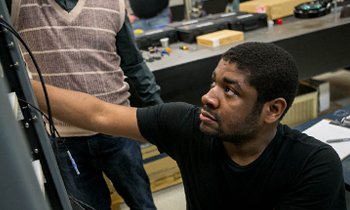Physics jobs you probably didn't know existed
 With a physics degree you build models, test ideas and explain what the data means. It's how physics degrees are able to excel in diverse careers. Employers are looking for those skills in healthcare, games, aerospace, and research.
With a physics degree you build models, test ideas and explain what the data means. It's how physics degrees are able to excel in diverse careers. Employers are looking for those skills in healthcare, games, aerospace, and research.
From shaping the future to redefining what's possible, see what a physics degree can do at Central Michigan University.
Here are some fascinating physics jobs you might not know about:
Medical physicist
In hospitals, medical physicists turn physics into care. You plan radiation treatments with physicians and calibrate imaging systems so scans stay trustworthy. You commission new equipment, run daily QA and log results so care stays safe. You also tune X-ray, MRI and CT so pictures stay sharp at the lowest reasonable dose. The American Board of Radiology reports that medical physics certification includes two computer-based exams (Part 1 and Part 2) and a Part 3 oral exam after accredited training.
Acoustics engineer
A quiet car cabin and a hall where every seat hears the same note are not accidents. Using wave math and materials, acoustics engineers shape how rooms, vehicles and devices handle sound. You’ll find this work in architecture, audio, transportation and entertainment. The Acoustical Society of America posts current roles and entry requirements across audio, architecture and transportation.
Renewable energy specialist
In clean energy you model solar arrays, wind farms and storage so output is higher and waste is lower. Specialists improve how panels, turbines and batteries perform, and study how energy moves through each part of the system. The U.S. Department of Energy reports clean-energy jobs grew 4.9% in 2023, more than twice the national rate.
Video game physics developer
Games feel right when motion makes sense. Collisions, gravity and fluids run on code that follows the rules of physics. Studios need developers who code and tune physics systems like collisions, rigid bodies, fluids and cloth. According to the Entertainment Software Association, U.S. spending on video games reached $58.7 billion in 2024 (theesa.com). Realistic motion makes a racer tense and a platformer fair — both come from models you test and tune.
Space mission analyst
Not every space job means flying. Mission analysts design trajectories, select transfer windows and protect fuel margins so missions reach their targets safely and on time. Teams also schedule telescopes and satellites, manage risk and keep operations on track. NASA says spacecraft navigation ties together mission design, orbit determination and flight-path control.
Forensic physicist
After a crash or failure, physics helps reconstruct cause using motion, materials and images. The job rewards careful setup and clear explanations that help courts and safety teams act. The National Institute of Justice notes that physics supports trajectory analysis, impact studies and materials failure work in investigations.

Data scientist
Large datasets hide useful patterns. Physics pairs well with data work because the steps are familiar. You frame a question, build a small model, test it on new data and explain the next step. The Bureau of Labor Statistics reports a $112,590 median wage in May 2024 and strong growth ahead.
Optics and photonics engineer
Light is a tool you can shape. Day to day you build and test lasers, lenses and sensors for medical devices, fiber networks and imaging systems. Some days you align a beam on an optics bench. Other days you write a small script to clean up image data. Optica reports that photonics underpins tools in health care, telecom and manufacturing.
Semiconductor process engineer
The chips that run phones, cars, satellites and medical gear have to hit tight tolerances. In a fab, process engineers set up lithography, watch deposition rates, run etch and verify dimensions with metrology. Small misses become big failures, so you measure, adjust and measure again. According to CHIPS for America, new investments are expanding training and hiring across fabs and suppliers, which opens more paths for graduates with a physics degree.

Is a physics degree right for you?
If you’re considering a physics degree, think about the range: healthcare, gaming, renewable energy and space. It’s a versatile degree that prepares you for useful, real jobs.
At CMU, our physics program helps you build those skills. You get hands-on lab time, work with faculty on real projects and shape a portfolio you can show to a hiring manager. Whether you want to tune a sound system, fight climate change or design the next hit game, CMU’s physics degree helps you get there.
Ready to start your journey? Explore CMU’s physics program and talk with an advisor about mapping your courses.